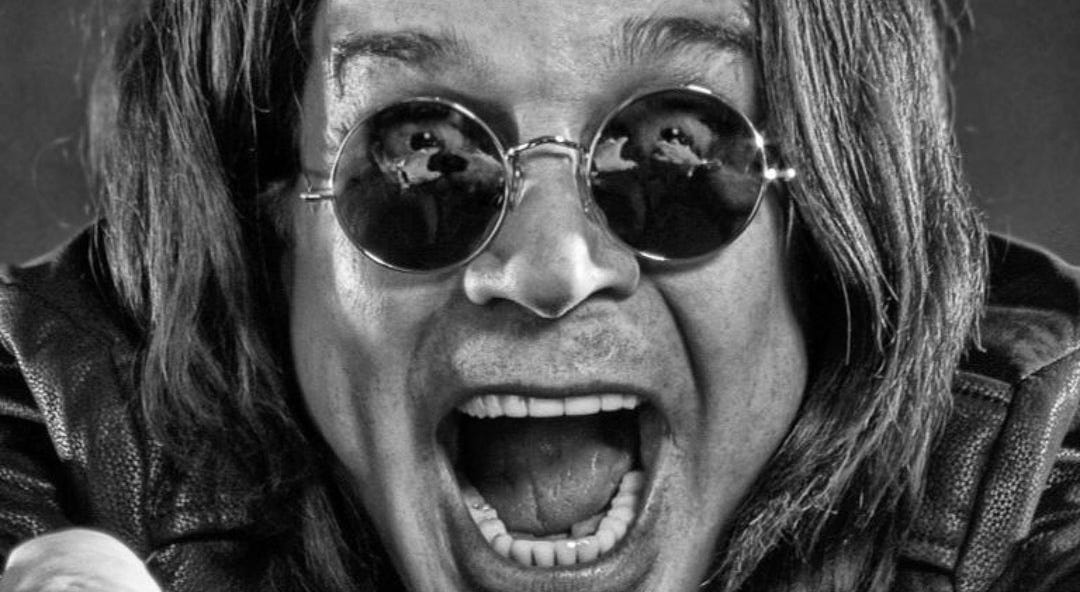The Prince of Lightness
Why do people care about Ozzy?
It’s been genuinely fascinating over the last week to watch the outpouring of interest in Ozzy Osbourne. He was, let’s face it, a shambles of a human being whose tangled life included some pretty unforgivable behavior, including killing an alleged seventeen cats with a shotgun while out of his mind on drugs. Never mind biting the head off a bat (possibly in error), this is very, very not-cool. As the lurching, befuddled dad in the reality show that launched him and his family into a wider consciousness he was fun to watch, but you wouldn’t want to actually be him (or his child).
In terms of his career, while Black Sabbath may have had a critical role in the birth of heavy metal they were not (for me, you may absolutely disagree) a great band — a stepping stone, rather than a destination — and Ozzy’s vocals were distinctive primarily through his policy of doggedly sticking to singing the root note of every chord in a way that makes Liam Gallagher sound like Mariah Carey. Honestly the only song of his I ever want to hear again is Crazy Train, and that’s mainly for the opening riff (this clip provides a fine example of Ozzy’s “Shit-faced Uncle Doing Karaoke” performance style).
And yet something about his life in sum has led to great interest, and reflection, and a kind of shock in its passing. His (final) farewell gig this year was the highest-grossing charity concert of all time. There was a huge attendance for his funeral procession. The socials have been full of little snippets about him. The Coldstream Guards outside Buckingham Palace, for heaven’s sake, played a version of Paranoid in tribute. This is a reaction out of proportion to his cultural weight.
Or is it?
Before and since his death, many stories have emerged about his support of up and coming bands — most evident in Ozzfest, but also a lifelong policy, as Metallica vocally attest — and kindness to many individuals and quiet financial support to worthy organizations. But much of this was under the radar, or operated outside the world of people who don’t much care for shouty metal bands. I think the magnitude of the reaction comes down to three other things.
The first is what kind of person he appeared to be. A reality show makes a family feel like they’re your family — only more entertaining, and a safe distance away. Within this he was something of a disaster but also basically kind, and frequently funny (humor is a family’s lifeblood), and his family clearly loved him despite everything, and just as evidently he loved them. The possibility of warmth and love within chaotic disfunction is important and attractive to all of us, especially those who may be living through their own versions of it.
Secondly, in music, despite the “Prince of Darkness” schtick he had a firmly everyman quality. He didn’t take himself seriously. His penultimate tour was called “No More Tours II”, which is objectively funny. This wasn’t some technician whose skill made him admirable but unapproachable. He was more like one of us, tunelessly bellowing a song in the shower when we’re confident nobody else is at home.
He couldn’t really sing. Yet he sang. That’s important.
And maybe most resonant of all, it felt as if Ozzy had an impish or even Trickster quality. Nothing about his life seemed to operate within the normal lines. He was like a pinball that smashed its way out of the machine and kept ricocheting around the world with cheerful abandon and a blithe disregard for everything that constrains us.
In a world that can feel increasingly dark, and in which we’re mountingly aware of political, financial and technical forces building walls between us — meanwhile fencing us into progressively smaller corners — I wonder if Ozzy Osbourne somehow represented a freedom, and a good-humored anarchic spirit, that we fear is in its end days.



He seems to have done a lot of good by stealth, especially donations to causes in his native Birmingham, not shouting about it but just quietly sending money. And, as you say, he had an endearingly baffled quality - his attitude was less "do you know who I am?" and more "does anyone know where I am?"
Funny, isn't it - Ronnie James Dio was the lead singer of Sabbath for around eight hundred years, but if you ASK anyone who the lead singer is...
People die every day. Where I live, they post small notices when someone elderly passes away. A simple announcement: this person has died. If you knew them, or if you want to spend a Sunday afternoon paying your respects to a stranger, come. I went. Why not? I was curious. I pictured the whole town gathering, everyone there, sharing the weight of loss. Six and a half people showed up. I'm counting the cat.
I talked to one of them - the part-time butcher who stocks shelves at the supermarket. He seemed glad to see a familiar face. He knew her well. "She was easy to talk to," he said. She gave to charity. She played guitar. She knitted sweaters - handmade clothes for her family, year after year. The newspapers didn't write about her. The Coldstream Guards didn't play her guitar riffs outside Buckingham Palace. But she had a good life. She lived among us. She mattered to at least six people - including me, now. Maybe I'm her newest, quietest fan.
_____
She wasn't Ozzy Osbourne or any kind of cultural figure with their contradictions and excessive ways of living. Her $30 to charity means the same as someone else's hundreds of thousands - maybe more, without the tax breaks. When it comes to death, everyone on earth perhaps deserves the same level of attention. Not the media circus, but the respect.